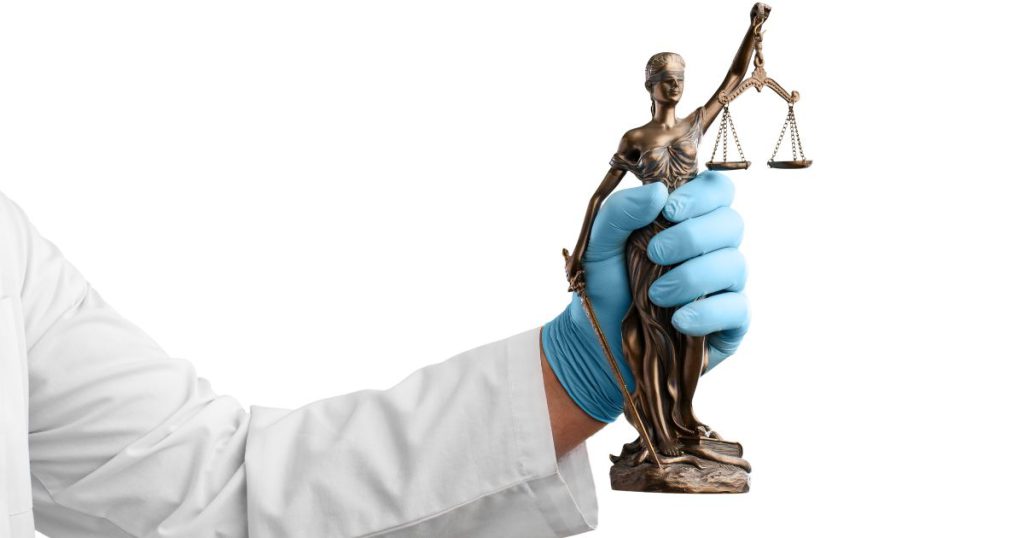What is the Study of Forensic Medicine?
Table of Contents
Ever watched a crime show and marveled at how they catch the bad guys using science? Welcome to the world of forensic medicine! It’s the real-life version of CSI, where science meets the law to solve mysteries. Stick around to uncover more!
Introduction
“What is the study of forensic medicine?” you might ask. Well, it’s a fascinating field that combines the rigor of medical science with the thrill of detective work. It’s a world where lab coats meet law enforcement, where microscopes and DNA tests are as crucial as witness testimonies. If you’ve ever been intrigued by crime scene investigations or medical mysteries, then buckle up, because you’re in for an exciting journey into the world of forensic medicine.
“Forensic medicine is a science that unfolds the mysteries of the stories that bodies, alive or dead, have to tell. It’s about seeking the truth.”
Dr. Cyril Wecht
What is the Study of Forensic Medicine?
Forensic medicine, also known as forensic pathology or legal medicine, is a specialized field within medical technology that applies scientific knowledge and techniques to assist in legal investigations. It involves the examination of deceased individuals to determine the cause, manner, and circumstances of their death. Forensic Medicine utilizes various medical technologies such as autopsies, toxicology analysis, DNA testing, and histopathology to gather evidence and provide objective findings. These findings are crucial in criminal investigations, civil litigation, and the administration of justice. Medical technology professionals in this field work closely with law enforcement agencies, coroners, and legal professionals to ensure accurate and reliable forensic analysis, ultimately contributing to the resolution of criminal cases and the establishment of justice in society.
Moreover, the field of forensic medicine is not limited to post-mortem examinations. It also encompasses clinical forensic medicine where living individuals are examined. For instance, this could involve assessing injuries of assault victims, determining the capacity of individuals to stand trial, or evaluating suspected cases of child abuse. Thus, the study of forensic medicine is a diverse and multidisciplinary field that combines elements of medicine, science, and law to serve the public and the justice system.

The Role of Forensic Medicine in the Justice System
Forensic medicine plays a pivotal role in the justice system. It provides the scientific backbone to investigations, helping to establish the facts of a case. From determining the cause of death in a suspicious case to identifying a suspect through DNA evidence, the work of forensic medicine professionals is often instrumental in solving crimes and bringing perpetrators to justice.
Forensic medicine extends beyond the realm of criminal justice. It also plays a crucial role in civil cases, such as determining the cause of an unexpected death in a hospital or assessing injuries in personal injury lawsuits. In these scenarios, the expertise of a forensic professional can help to establish the truth, ensuring that justice is served.
The field of forensic medicine is continually evolving, with advancements in technology and science opening up new possibilities for investigation. For instance, the advent of DNA sequencing has revolutionized the way we can identify individuals and determine familial relationships. Similarly, developments in imaging technology have enhanced our ability to understand the causes and mechanisms of injuries. These advancements underscore the dynamic nature of forensic medicine and its ongoing importance in our justice system.
Forensic Medicine and Public Health
Beyond its role in the justice system, forensic medicine also has significant implications for public health. By studying patterns of injury or disease in deceased individuals, forensic medicine can help identify public health issues and inform prevention strategies. For instance, forensic investigations into drug-related deaths can shed light on substance abuse trends and inform public health interventions.
Forensic medicine plays a pivotal role in responding to public health crises, such as pandemics or natural disasters. In such scenarios, forensic practitioners are often called upon to investigate cause of death on a large scale, which can provide crucial data to public health officials. This information can guide policy decisions, help allocate resources effectively, and shape strategies to mitigate the impact of future crises.
Forensic medicine contributes to public health through its work in identifying victims of mass disasters or acts of terrorism. This not only provides closure for affected families, but also aids in the broader public health response by helping authorities understand the nature and extent of the event. This can lead to improved emergency response protocols, better disaster preparedness, and ultimately, a more resilient public health infrastructure.
Careers in Forensic Medicine
A career in forensic medicine can be both challenging and rewarding. Professionals in this field need a strong foundation in medical science, as well as an understanding of legal principles. They also need to have strong analytical skills, as they often need to make sense of complex and sometimes conflicting evidence. Careers in forensic medicine can range from forensic pathologists, who conduct autopsies and determine cause of death, to forensic toxicologists, who analyze biological samples for the presence of drugs and toxins.
In addition to these roles, there are also opportunities in forensic psychiatry, where professionals assess the mental health of individuals in legal contexts, and forensic odontology, which involves the study of dental evidence. Each of these roles plays a crucial part in the justice system, helping to ensure that the truth is uncovered and justice is served.
Moreover, the field of forensic medicine is continually evolving with advancements in technology and science. This means that professionals in this field are often at the forefront of new discoveries and techniques, making it an exciting and dynamic career choice. Whether it’s using new DNA sequencing techniques to identify victims or developing better methods to detect drug use, forensic medicine professionals are constantly pushing the boundaries of what’s possible in the pursuit of truth.
Common Specialties within Forensic Medicine
| Specialty | Description |
|---|---|
| Forensic Pathology | Involves determining the cause of death by examining a corpse. Forensic pathologists are also often called to testify in court. |
| Forensic Toxicology | Focuses on the study of drugs and poisons, and their effects on the human body in relation to medical and legal cases. |
| Forensic Psychiatry | The intersection of mental health and the law. Forensic psychiatrists may assess a person’s competency to stand trial or provide expert testimony on mental health issues in court. |
| Forensic Odontology | Involves the study of teeth to identify unknown remains and bite marks. They may also testify in cases of dental malpractice. |
| Forensic Nursing | These are registered nurses who specialize in treating victims and perpetrators of trauma and abuse. They also often play a role in collecting evidence and may testify in court. |
Forensic Medicine Education and Training
Education and training in forensic medicine typically involve a combination of medical study and practical forensic training. Many professionals in this field start their journey with a degree in medicine or a related field, followed by specialized training in forensic science. Some institutions, like the Philadelphia College of Medicine (PCOM), offer dual degree programs that combine medical education with forensic science training.
At the postgraduate level, aspiring forensic medicine professionals can pursue a Master’s degree in Forensic Medicine. This program typically includes coursework in forensic pathology, toxicology, and legal principles, among other areas. Practical training often involves working in a medical examiner’s office or similar setting, where students can gain hands-on experience in forensic investigation.
In addition to formal education, ongoing training is a crucial part of a career in forensic medicine. This field is continually evolving, with new techniques and technologies emerging regularly. Professionals must stay up-to-date with these developments to ensure they’re using the most accurate and effective methods in their work. This commitment to lifelong learning is one of the things that makes a career in forensic medicine both challenging and rewarding.
Key skills that are crucial in the field of forensic medicine
- Analytical skills: Forensic professionals must be able to examine and analyze evidence from a variety of sources.
- Attention to detail: The smallest detail can be crucial in a forensic investigation.
- Communication skills: Forensic professionals often have to present their findings to others, including in courtrooms.
- Understanding of legal principles: Forensic professionals need to understand the legal principles that guide their work, including the rules of evidence.
- Scientific knowledge: A strong background in science is crucial in forensic medicine, as it involves applying scientific principles to investigate crimes or medical issues.
Forensic Medicine: A Field of Constant Evolution
Like many fields of science, forensic medicine is constantly evolving. New technologies and techniques, such as advanced DNA analysis and digital forensics, are continually expanding the capabilities of forensic investigations. As such, professionals in this field need to be lifelong learners, staying up-to-date with the latest developments in order to provide the most accurate and reliable forensic analysis.
In addition, the field of forensic medicine is becoming increasingly interdisciplinary. Today’s forensic teams often include not just medical professionals, but also chemists, biologists, computer scientists, and even psychologists. This collaborative approach allows for a more comprehensive understanding of the evidence, leading to more accurate and insightful conclusions.
Moreover, the role of forensic medicine extends beyond the realm of criminal justice. Its principles and techniques are also applied in public health, environmental science, and even historical investigations. From identifying the cause of a mysterious disease outbreak to determining the authenticity of a historical artifact, the applications of forensic medicine are as diverse as they are fascinating.
The Future of Forensic Medicine
The future of forensic medicine is bright, with many exciting developments on the horizon. From the growing use of AI in forensic analysis to the potential of genomics in identifying individuals, the field is set to continue its vital role in the justice system and beyond.
As we move forward, the integration of technology in forensic medicine is expected to become even more pronounced. Imagine a world where AI systems can swiftly sift through thousands of pieces of evidence, identifying patterns and connections that would take a human investigator much longer to uncover. This isn’t just a pipe dream – it’s a reality that’s already starting to take shape.
Moreover, the field of genomics is opening up new possibilities for forensic medicine. With the ability to sequence an individual’s entire genome, we’re gaining unprecedented insights into our genetic makeup. This could revolutionize forensic identification, making it possible to identify individuals with a level of precision that was previously unimaginable. As these technologies continue to evolve, the future of forensic medicine looks set to be as exciting as it is promising.
Frequently Asked Questions
What is forensic medicine?
Forensic medicine, also known as medical jurisprudence, is the application of medical knowledge to the investigation of crime, particularly in establishing the causes of injury or death. It’s a multidisciplinary field that involves the study of anatomy, pathology, and physical anthropology, among others.
What are some of the key areas of study in forensic medicine?
Forensic medicine encompasses several key areas of study, including forensic pathology, forensic toxicology, forensic anthropology, and forensic psychiatry. Each of these areas applies medical knowledge in unique ways to aid in the investigation and resolution of legal cases.
How is forensic medicine used in the justice system?
Forensic medicine plays a crucial role in the justice system. Forensic pathologists, for example, conduct autopsies to determine the cause and manner of death in cases of suspected foul play. Forensic toxicologists analyze biological samples for the presence of drugs and poisons, which can be crucial in cases of suspected overdose or poisoning. Forensic psychiatrists may be called upon to assess an individual’s mental state at the time of a crime, which can be a key factor in determining guilt or innocence.
What are some of the advancements in forensic medicine?
The field of forensic medicine is continually evolving, with advancements in technology leading to more accurate and efficient methods of investigation. For example, the use of DNA analysis has revolutionized the field, allowing for precise identification of individuals involved in a crime. More recently, the application of artificial intelligence and machine learning techniques is showing promise in areas such as image analysis and pattern recognition.
What is the future of forensic medicine?
The future of forensic medicine is likely to be shaped by advancements in technology. The growing use of artificial intelligence in forensic analysis and the potential of genomics in identifying individuals are just two examples of areas where we can expect to see significant developments. Furthermore, as our understanding of the human body and mind continues to grow, this will undoubtedly open up new avenues for investigation in forensic medicine.
Interested in learning more about forensic medicine? Check out the Forensic Medicine category on my website for more articles and resources on this exciting subject.
Sources for “What is the Study of Forensic Medicine?”
Forensic medicine | Definition & Facts – Encyclopedia Britannica
Sean Schepers is a third-year Medical Technology student at Mahidol University with a passion for all things health and medicine. His journey into the world of medicine has led him to explore various fields. Sean's blog posts offer a unique perspective, combining his academic insights with personal experiences. When he's not studying or blogging, Sean enjoys keeping up with politics and planning his future career in medicine.
In addition to his studies, Sean serves as the chairman of the Rights, Liberties, and Welfare Committee, a role that reflects his commitment to advocacy and social justice. Beyond his academic pursuits, Sean offers tutoring services in English and Biology, further demonstrating his dedication to education and mentorship. His journey is one of continuous discovery, and he invites others to join him as he explores the dynamic and transformative world of medical technology.


